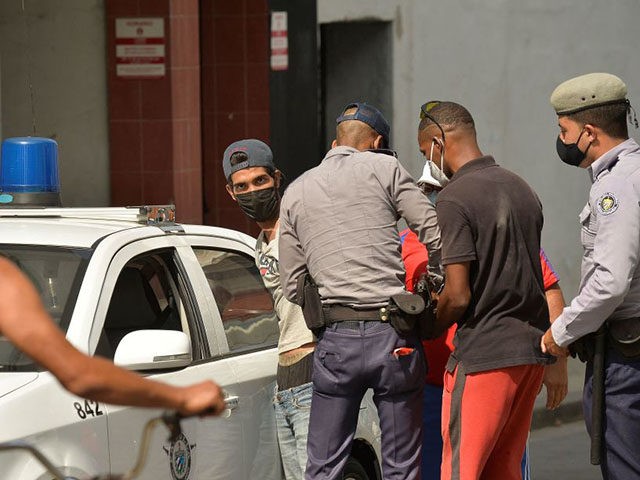The Cuban Observatory for Human Rights (OCDH), a non-governmental organization that tracks detentions on the island, documented over 1,000 disappearances or arrests in Cuba between July 11, the day nationwide protests began on the island, and August 1.
The July 11 protests triggered a global rallying cry for international action to end the 62-year-old Castro regime, which continues to maintain a stranglehold on the island despite attempts to portray President Miguel Díaz-Canel as a new leader distinct from the Castro family rulers embedded in the Communist Party’s most powerful military positions. The protests themselves, occurring in as many as 40 different municipalities across the country, were the largest Cuba has experienced in years and followed extensive civil society organizing by various pro-democracy groups since at least the 2003 “Black Spring” crackdown.
While the July 11 protests were, by all accounts, overwhelmingly peaceful, Cuban authorities responded by deploying state security and its repressive “black beret” special forces to conduct mass arrests, open fire on crowds of dissidents, and perform public beatings to scare anyone considering joining the movement. Díaz-Canel also appeared on television on the night of July 11 issuing an “order of combat” to civilians sympathetic with the regime, encouraging them to physically attack anyone they considered may support the protests.
Dissidents on the island have described the nearly three weeks since the July 11 protests as intensely violent. The “black beret” forces have conducted door-to-door raids looking for suspected protesters in nearly every major city and shot protesters in their own homes. The legal system is so overwhelmed, according to the NGO Cuban Prisoners Defenders, that courts are processing and sentencing as many as 30 people at once with no regard for differences in their cases and, in many cases, not granting them access to an attorney.
Initial reports from Cuban journalists working on the island suggested that police had detained as many as 5,000 people in the immediate aftermath of July 11. Activists still insist this week that the true toll of those missing and arresting remains incomplete as so many remote towns in the interior of the country engaged in protests and so many of those marching are not known active dissidents with networks outside of the country. As of Monday, however, the OCDH tally is the largest known confirmed number of people missing or in police custody since protests began.
According to the NGO, 1,004 Cubans remain missing or arrested as of July 11, the vast majority of them (795) men. At least 21 of those arrested or disappeared are children, the group noted, describing the last few weeks in Cuba as “20 days of savage repression.”
Cuban police appeared to arrest some of the most internationally known political dissidents first as protests began. Still missing, with no proof of life, is the head of the Patriotic Union of Cuba (UNPACU) José Daniel Ferrer. UNPACU is believed to be the largest pro-democracy group on the island, but no evidence suggests that Ferrer played any role in the protests. Ferrer is a veteran of the “Black Spring” arrests of 2003 and often faces arrest and disappearance, most recently disappeared in October 2019 and resurfacing 6 months later accusing the regime of torture and medical neglect in prison. The regime sentenced Ferrer to four years of house arrest in April 2020. Ferrer disappeared in far-east Santiago de Cuba.
Also missing is the founder of the pro-democracy collective the San Isidro Movement, Luis Manuel Otero Alcántara. Otero’s group was largely responsible for organizing large protests at the Ministry of Culture headquarters in Havana last year and suffers severe persecution, even though Otero himself has said that they “do not want to topple the dictatorship.”
Cuban police also appeared to disproportionately target religious leaders. The Cuban Communist Party is an atheist organization and has engaged in decades of intense persecution against Christians on the island. Groups like the santería movement, who practice a syncretic religion largely based on Yoruba Nigerian paganism, have also endured persecution even among decades of rumors that Fidel Castro himself dabbled in santería practices.
In one particularly violent incident, Cuban authorities publicly beat a Catholic priest, Father Castor José Álvarez Devesa, and cracked his head before detaining him in his native Camagüey, which experienced some of the largest July 11 protests. Police released Álvarez only after receiving international condemnation and, in his message following his release, the clergyman clearly sported visible injuries to the head.
Still missing are several members of the Association of Free Yorubas of Cuba, a santería group that refuses to worship under the auspices of the atheist Communist Party. According to the Global Liberty Alliance, a human rights advocacy group, at least six members were arrested for participating in protests.
The OCDH estimated in a report published in July that Cuban repressive forces have performed over 30,000 politically motivated arrests in the last five years, many repeat incidents against the island’s most vocal dissidents.
Follow Frances Martel on Facebook and Twitter.

COMMENTS
Please let us know if you're having issues with commenting.